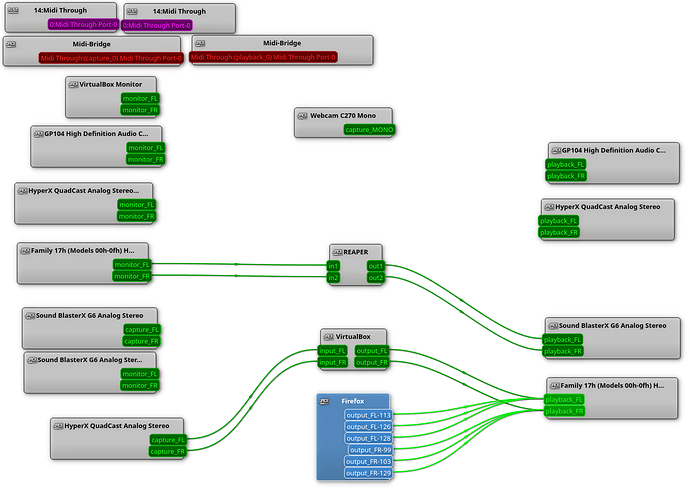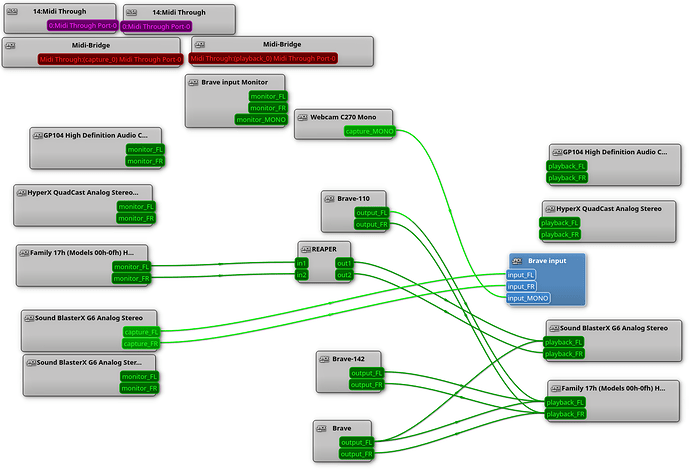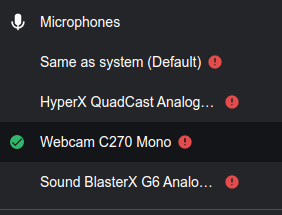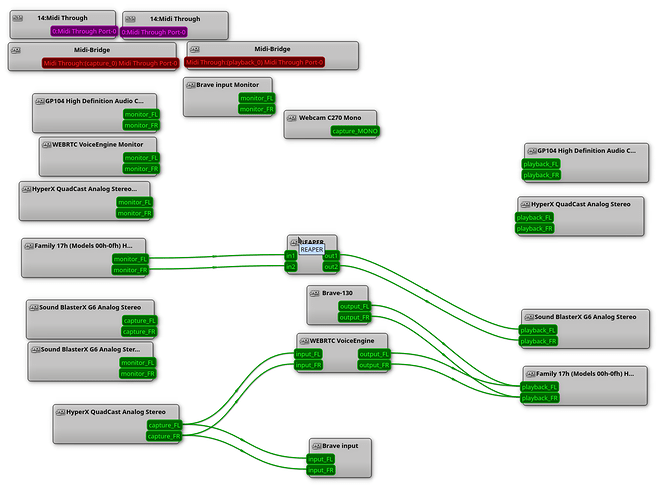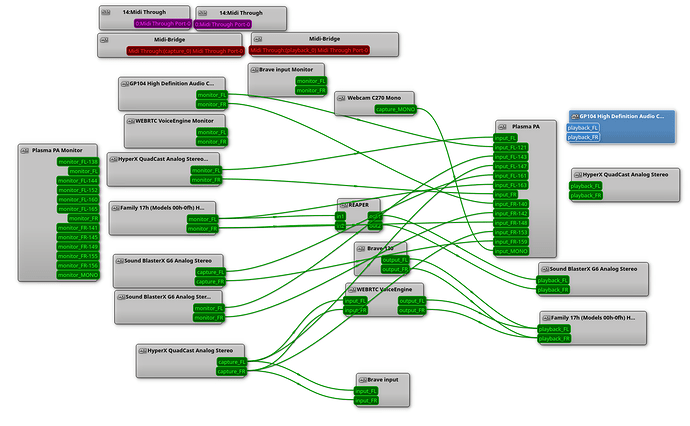I had sound issues after installing the last update, first noticed by my HyperX Quadcast USB mic appearing to be exclusive to one application at a time. I talked fine on Jitsi for over an hour, but as soon as I added a Discord conversation, Jitsi no longer got sound from my mic. When I refreshed the Jitsi page, Discord lost input from my mic. When I quit and reopened Discord, Jitsi lost input from the mic.
I use pipewire with jack2 and qjackctl, so I opened the qjacktl graph to see what was going on and it didn’t show the icon for my Quadcast capture outputs. I didn’t have time to mess with it last night, so I reverted to a previous btrfs snapshot and all worked fine again.
This morning, I followed the instructions above to remove the pulse tdb and cookie files from .config and I reapplied the patches and played around a little more. I started by opening my qjackctl graph to watch what happened when I opened Jitsi and Discord again and used the mic/sound tests that they both have. I should have kept better notes on exactly what happened when, but as I tested -all- the inputs and outputs in the qjackctl graph disappeared. I usually have about 20 sets of inputs and outputs. After that, qjackctl crashed and from then on I didn’t have any sound, in or out, even after restarting qjackctl.
Here’s my inxi before the update:
System:
Kernel: 5.13.13-1-MANJARO x86_64 bits: 64 compiler: gcc v: 11.1.0
parameters: root=UUID=0a3ac3d6-bfa8-42c5-ae7e-205a1a8c1849 rw
rootflags=subvol=@ quiet apparmor=1 security=apparmor
resume=UUID=a343a3de-0210-4fae-9e8e-68f35e824558 udev.log_priority=3
initrd=@\boot\initramfs-5.13-x86_64.img
Desktop: KDE Plasma 5.22.5 tk: Qt 5.15.2 wm: kwin_x11 vt: 1 dm: SDDM
Distro: Manjaro Linux base: Arch Linux
Machine:
Type: Desktop Mobo: ASUSTeK model: ROG STRIX X470-F GAMING v: Rev X.0x
serial: <filter> UEFI: American Megatrends v: 5861 date: 08/10/2021
Battery:
Message: No system battery data found. Is one present?
Memory:
RAM: total: 31.26 GiB used: 7.46 GiB (23.9%)
Array-1: capacity: 128 GiB slots: 4 EC: None max-module-size: 32 GiB
note: est.
Device-1: DIMM_A1 size: 8 GiB speed: 3000 MT/s type: DDR4
detail: synchronous unbuffered (unregistered) bus-width: 64 bits
total: 64 bits manufacturer: Corsair part-no: CMK16GX4M2B3000C15 serial: N/A
Device-2: DIMM_A2 size: 8 GiB speed: 3000 MT/s type: DDR4
detail: synchronous unbuffered (unregistered) bus-width: 64 bits
total: 64 bits manufacturer: Corsair part-no: CMK16GX4M2B3000C15 serial: N/A
Device-3: DIMM_B1 size: 8 GiB speed: 3000 MT/s type: DDR4
detail: synchronous unbuffered (unregistered) bus-width: 64 bits
total: 64 bits manufacturer: Corsair part-no: CMK16GX4M2B3000C15 serial: N/A
Device-4: DIMM_B2 size: 8 GiB speed: 3000 MT/s type: DDR4
detail: synchronous unbuffered (unregistered) bus-width: 64 bits
total: 64 bits manufacturer: Corsair part-no: CMK16GX4M2B3000C15 serial: N/A
CPU:
Info: 8-Core model: AMD Ryzen 7 2700X socket: AM4 bits: 64 type: MT MCP
arch: Zen+ family: 17 (23) model-id: 8 stepping: 2 microcode: 800820D cache:
L1: 768 KiB L2: 4 MiB L3: 16 MiB bogomips: 118445
Speed: 2193 MHz min/max: 2200/3700 MHz base/boost: 3700/4350 boost: enabled
volts: 1.2 V ext-clock: 100 MHz Core speeds (MHz): 1: 2193 2: 2194 3: 2195
4: 2192 5: 2176 6: 2162 7: 2186 8: 2182 9: 2195 10: 2190 11: 2185 12: 2163
13: 2179 14: 2182 15: 2196 16: 2193
Flags: 3dnowprefetch abm adx aes aperfmperf apic arat avic avx avx2 bmi1
bmi2 bpext clflush clflushopt clzero cmov cmp_legacy constant_tsc cpb cpuid
cr8_legacy cx16 cx8 de decodeassists extapic extd_apicid f16c flushbyasid
fma fpu fsgsbase fxsr fxsr_opt ht hw_pstate ibpb irperf lahf_lm lbrv lm mca
mce misalignsse mmx mmxext monitor movbe msr mtrr mwaitx nonstop_tsc nopl
npt nrip_save nx osvw overflow_recov pae pat pausefilter pclmulqdq pdpe1gb
perfctr_core perfctr_llc perfctr_nb pfthreshold pge pni popcnt pse pse36
rdrand rdseed rdtscp rep_good sep sev sev_es sha_ni skinit smap smca sme
smep ssbd sse sse2 sse4_1 sse4_2 sse4a ssse3 succor svm svm_lock syscall tce
topoext tsc tsc_scale v_vmsave_vmload vgif vmcb_clean vme vmmcall wdt
xgetbv1 xsave xsavec xsaveerptr xsaveopt xsaves
Vulnerabilities: Type: itlb_multihit status: Not affected
Type: l1tf status: Not affected
Type: mds status: Not affected
Type: meltdown status: Not affected
Type: spec_store_bypass
mitigation: Speculative Store Bypass disabled via prctl and seccomp
Type: spectre_v1
mitigation: usercopy/swapgs barriers and __user pointer sanitization
Type: spectre_v2 mitigation: Full AMD retpoline, IBPB: conditional, STIBP:
disabled, RSB filling
Type: srbds status: Not affected
Type: tsx_async_abort status: Not affected
Graphics:
Device-1: NVIDIA GP104 [GeForce GTX 1080] vendor: ASUSTeK driver: nvidia
v: 470.63.01 alternate: nouveau,nvidia_drm bus-ID: 09:00.0
chip-ID: 10de:1b80 class-ID: 0300
Device-2: Logitech Webcam C270 type: USB driver: snd-usb-audio,uvcvideo
bus-ID: 5-1:2 chip-ID: 046d:0825 class-ID: 0102 serial: <filter>
Display: x11 server: X.Org 1.20.13 compositor: kwin_x11 driver:
loaded: nvidia display-ID: :0 screens: 1
Screen-1: 0 s-res: 4096x2160 s-dpi: 80 s-size: 1300x686mm (51.2x27.0")
s-diag: 1470mm (57.9")
Monitor-1: HDMI-0 res: 4096x2160 hz: 60 dpi: 406 size: 256x135mm (10.1x5.3")
diag: 289mm (11.4")
OpenGL: renderer: NVIDIA GeForce GTX 1080/PCIe/SSE2
v: 4.6.0 NVIDIA 470.63.01 direct render: Yes
Audio:
Device-1: NVIDIA GP104 High Definition Audio vendor: ASUSTeK
driver: snd_hda_intel v: kernel bus-ID: 09:00.1 chip-ID: 10de:10f0
class-ID: 0403
Device-2: AMD Family 17h HD Audio vendor: ASUSTeK driver: snd_hda_intel
v: kernel bus-ID: 0b:00.3 chip-ID: 1022:1457 class-ID: 0403
Device-3: Kingston HyperX QuadCast type: USB
driver: hid-generic,snd-usb-audio,usbhid bus-ID: 1-3:2 chip-ID: 0951:16df
class-ID: 0300 serial: <filter>
Device-4: Logitech Webcam C270 type: USB driver: snd-usb-audio,uvcvideo
bus-ID: 5-1:2 chip-ID: 046d:0825 class-ID: 0102 serial: <filter>
Device-5: Creative Sound BlasterX G6 type: USB
driver: hid-generic,snd-usb-audio,usbhid bus-ID: 5-2:3 chip-ID: 041e:3256
class-ID: 0300 serial: <filter>
Sound Server-1: ALSA v: k5.13.13-1-MANJARO running: yes
Sound Server-2: sndio v: N/A running: no
Sound Server-3: JACK v: 1.9.19 running: no
Sound Server-4: PulseAudio v: 15.0 running: no
Sound Server-5: PipeWire v: 0.3.34 running: yes
Network:
Device-1: Intel I211 Gigabit Network vendor: ASUSTeK driver: igb v: kernel
port: e000 bus-ID: 07:00.0 chip-ID: 8086:1539 class-ID: 0200
IF: enp7s0 state: up speed: 1000 Mbps duplex: full mac: <filter>
IP v4: <filter> type: dynamic noprefixroute scope: global
broadcast: <filter>
IP v6: <filter> type: noprefixroute scope: link
IF-ID-1: virbr0 state: down mac: <filter>
IP v4: <filter> scope: global broadcast: <filter>
WAN IP: <filter>
Bluetooth:
Device-1: Broadcom BCM20702A0 Bluetooth 4.0 type: USB driver: btusb v: 0.8
bus-ID: 5-4:5 chip-ID: 0a5c:21e8 class-ID: fe01 serial: <filter>
Report: rfkill ID: hci0 rfk-id: 0 state: up address: see --recommends
Logical:
Message: No logical block device data found.
RAID:
Message: No RAID data found.
Drives:
Local Storage: total: 3.86 TiB used: 1.28 TiB (33.2%)
ID-1: /dev/nvme0n1 maj-min: 259:4 vendor: Samsung model: SSD 970 EVO 1TB
size: 931.51 GiB block-size: physical: 512 B logical: 512 B speed: 31.6 Gb/s
lanes: 4 type: SSD serial: <filter> rev: 2B2QEXE7 temp: 35.9 C scheme: GPT
SMART: yes health: PASSED on: 107d 17h cycles: 221
read-units: 18,752,985 [9.60 TB] written-units: 22,204,824 [11.3 TB]
ID-2: /dev/nvme1n1 maj-min: 259:0 vendor: Samsung model: SSD 970 EVO 1TB
size: 931.51 GiB block-size: physical: 512 B logical: 512 B speed: 31.6 Gb/s
lanes: 4 type: SSD serial: <filter> rev: 2B2QEXE7 temp: 34.9 C scheme: GPT
SMART: yes health: PASSED on: 33d 20h cycles: 221
read-units: 21,443,158 [10.9 TB] written-units: 35,249,596 [18.0 TB]
ID-3: /dev/sda maj-min: 8:0 vendor: Western Digital model: WD20PURZ-85GU6Y0
family: Purple size: 1.82 TiB block-size: physical: 4096 B logical: 512 B
sata: 3.0 speed: 6.0 Gb/s type: HDD rpm: 5400 serial: <filter> rev: 0A80
temp: 27 C scheme: MBR
SMART: yes state: enabled health: PASSED on: 1y 63d 10h cycles: 769
ID-4: /dev/sdb maj-min: 8:16 vendor: Kingston model: SV300S37A240G
family: Driven SSDs size: 223.57 GiB block-size: physical: 512 B
logical: 512 B sata: 3.0 speed: 6.0 Gb/s type: SSD serial: <filter>
rev: BBF0 temp: 27 C scheme: MBR
SMART: yes state: enabled health: PASSED on: 5y 342d 12h cycles: 631
read: 12955 GiB written: 13362 GiB
Message: No optical or floppy data found.
Partition:
ID-1: / raw-size: 891.96 GiB size: 891.96 GiB (100.00%)
used: 346.21 GiB (38.8%) fs: btrfs block-size: 4096 B dev: /dev/nvme1n1p3
maj-min: 259:3 label: N/A uuid: 0a3ac3d6-bfa8-42c5-ae7e-205a1a8c1849
ID-2: /boot/efi raw-size: 500 MiB size: 499 MiB (99.80%)
used: 4.8 MiB (1.0%) fs: vfat block-size: 512 B dev: /dev/nvme1n1p2
maj-min: 259:2 label: M2_2 uuid: 42F8-D26E
ID-3: /home raw-size: 891.96 GiB size: 891.96 GiB (100.00%)
used: 346.21 GiB (38.8%) fs: btrfs block-size: 4096 B dev: /dev/nvme1n1p3
maj-min: 259:3 label: N/A uuid: 0a3ac3d6-bfa8-42c5-ae7e-205a1a8c1849
ID-4: /mnt/C_Win raw-size: 511.45 GiB size: 511.45 GiB (100.00%)
used: 176.51 GiB (34.5%) fs: ntfs block-size: 4096 B dev: /dev/nvme0n1p4
maj-min: 259:8 label: C_Win uuid: 2CA4A7DDA4A7A7B2
ID-5: /mnt/G_SSD raw-size: 223.57 GiB size: 223.57 GiB (100.00%)
used: 101.54 GiB (45.4%) fs: btrfs block-size: 4096 B dev: /dev/sdb1
maj-min: 8:17 label: N/A uuid: ea787231-6c71-48b2-a0c5-0106614a479c
ID-6: /mnt/HDD raw-size: 1.06 TiB size: 1.06 TiB (100.00%)
used: 559.88 GiB (51.8%) fs: exfat block-size: 4096 B dev: /dev/sda1
maj-min: 8:1 label: N/A uuid: 9973-5D63
ID-7: /mnt/extra raw-size: 781.25 GiB size: 767.92 GiB (98.29%)
used: 127.99 GiB (16.7%) fs: ext4 block-size: 4096 B dev: /dev/sda2
maj-min: 8:2 label: N/A uuid: b57cfbd6-8385-480f-9800-c164cac69c9b
ID-8: /mnt/share raw-size: N/A size: 771.01 GiB used: 359.77 GiB (46.7%)
fs: nfs remote: 192.168.33.24:/mnt/share
ID-9: /run/timeshift/backup raw-size: 891.96 GiB size: 891.96 GiB (100.00%)
used: 346.21 GiB (38.8%) fs: btrfs block-size: 4096 B dev: /dev/nvme1n1p3
maj-min: 259:3 label: N/A uuid: 0a3ac3d6-bfa8-42c5-ae7e-205a1a8c1849
ID-10: /var/cache raw-size: 891.96 GiB size: 891.96 GiB (100.00%)
used: 346.21 GiB (38.8%) fs: btrfs block-size: 4096 B dev: /dev/nvme1n1p3
maj-min: 259:3 label: N/A uuid: 0a3ac3d6-bfa8-42c5-ae7e-205a1a8c1849
ID-11: /var/log raw-size: 891.96 GiB size: 891.96 GiB (100.00%)
used: 346.21 GiB (38.8%) fs: btrfs block-size: 4096 B dev: /dev/nvme1n1p3
maj-min: 259:3 label: N/A uuid: 0a3ac3d6-bfa8-42c5-ae7e-205a1a8c1849
Swap:
Kernel: swappiness: 10 (default 60) cache-pressure: 100 (default)
ID-1: swap-1 type: partition size: 39.06 GiB used: 21.5 MiB (0.1%)
priority: -2 dev: /dev/nvme1n1p1 maj-min: 259:1 label: N/A
uuid: a343a3de-0210-4fae-9e8e-68f35e824558
Unmounted:
ID-1: /dev/nvme0n1p1 maj-min: 259:5 size: 529 MiB fs: ntfs label: Recovery
uuid: 0CD2A280D2A26DA0
ID-2: /dev/nvme0n1p2 maj-min: 259:6 size: 100 MiB fs: vfat label: N/A
uuid: BAA4-DBF7
ID-3: /dev/nvme0n1p3 maj-min: 259:7 size: 16 MiB fs: N/A label: N/A
uuid: N/A
USB:
Hub-1: 1-0:1 info: Full speed (or root) Hub ports: 14 rev: 2.0
speed: 480 Mb/s chip-ID: 1d6b:0002 class-ID: 0900
Device-1: 1-3:2 info: Kingston HyperX QuadCast type: Audio,HID
driver: hid-generic,snd-usb-audio,usbhid interfaces: 4 rev: 1.1
speed: 12 Mb/s power: 100mA chip-ID: 0951:16df class-ID: 0300
serial: <filter>
Device-2: 1-5:3 info: Corsair CORSAIR SCIMITAR RGB ELITE Gaming Mouse
type: Mouse,HID driver: usbfs interfaces: 2 rev: 2.0 speed: 12 Mb/s
power: 300mA chip-ID: 1b1c:1b8b class-ID: 0300 serial: <filter>
Device-3: 1-9:4 info: ASUSTek AURA LED Controller type: HID
driver: hid-generic,usbhid interfaces: 1 rev: 2.0 speed: 12 Mb/s
power: 100mA chip-ID: 0b05:1872 class-ID: 0300 serial: <filter>
Hub-2: 2-0:1 info: Full speed (or root) Hub ports: 8 rev: 3.1 speed: 10 Gb/s
chip-ID: 1d6b:0003 class-ID: 0900
Hub-3: 3-0:1 info: Full speed (or root) Hub ports: 2 rev: 2.0
speed: 480 Mb/s chip-ID: 1d6b:0002 class-ID: 0900
Hub-4: 4-0:1 info: Full speed (or root) Hub ports: 2 rev: 3.1 speed: 10 Gb/s
chip-ID: 1d6b:0003 class-ID: 0900
Hub-5: 5-0:1 info: Full speed (or root) Hub ports: 4 rev: 2.0
speed: 480 Mb/s chip-ID: 1d6b:0002 class-ID: 0900
Device-1: 5-1:2 info: Logitech Webcam C270 type: Video,Audio
driver: snd-usb-audio,uvcvideo interfaces: 4 rev: 2.0 speed: 480 Mb/s
power: 500mA chip-ID: 046d:0825 class-ID: 0102 serial: <filter>
Device-2: 5-2:3 info: Creative Sound BlasterX G6 type: Audio,HID
driver: hid-generic,snd-usb-audio,usbhid interfaces: 5 rev: 2.0
speed: 480 Mb/s power: 500mA chip-ID: 041e:3256 class-ID: 0300
serial: <filter>
Device-3: 5-3:4
info: Corsair CORSAIR K95 RGB PLATINUM XT Mechanical Gaming Keyboard
type: Keyboard,HID,Mouse driver: usbfs interfaces: 4 rev: 2.0 speed: 12 Mb/s
power: 500mA chip-ID: 1b1c:1b89 class-ID: 0301 serial: <filter>
Device-4: 5-4:5 info: Broadcom BCM20702A0 Bluetooth 4.0 type: Bluetooth
driver: btusb interfaces: 4 rev: 2.0 speed: 12 Mb/s chip-ID: 0a5c:21e8
class-ID: fe01 serial: <filter>
Hub-6: 6-0:1 info: Full speed (or root) Hub ports: 4 rev: 3.0 speed: 5 Gb/s
chip-ID: 1d6b:0003 class-ID: 0900
Sensors:
System Temperatures: cpu: 37.2 C mobo: N/A gpu: nvidia temp: 45 C
Fan Speeds (RPM): N/A gpu: nvidia fan: 30%
Info:
Processes: 444 Uptime: 4h 4m wakeups: 0 Init: systemd v: 248 tool: systemctl
Compilers: gcc: 11.1.0 clang: 12.0.1 Packages: pacman: 1483 lib: 398
flatpak: 0 Shell: Bash (su) v: 5.1.8 running-in: konsole inxi: 3.3.06
And a diff of the inxi after update:
2c2
< Kernel: 5.13.13-1-MANJARO x86_64 bits: 64 compiler: gcc v: 11.1.0
---
> Kernel: 5.13.15-1-MANJARO x86_64 bits: 64 compiler: gcc v: 11.1.0
7,8c7
< Desktop: KDE Plasma 5.22.5 tk: Qt 5.15.2 wm: kwin_x11 vt: 1 dm: SDDM
< Distro: Manjaro Linux base: Arch Linux
---
> Console: tty pts/1 DM: SDDM Distro: Manjaro Linux base: Arch Linux
15c14
< RAM: total: 31.26 GiB used: 7.46 GiB (23.9%)
---
> RAM: total: 31.26 GiB used: 2.01 GiB (6.4%)
33,37c32,36
< L1: 768 KiB L2: 4 MiB L3: 16 MiB bogomips: 118445
< Speed: 2193 MHz min/max: 2200/3700 MHz base/boost: 3700/4350 boost: enabled
< volts: 1.2 V ext-clock: 100 MHz Core speeds (MHz): 1: 2193 2: 2194 3: 2195
< 4: 2192 5: 2176 6: 2162 7: 2186 8: 2182 9: 2195 10: 2190 11: 2185 12: 2163
< 13: 2179 14: 2182 15: 2196 16: 2193
---
> L1: 768 KiB L2: 4 MiB L3: 16 MiB bogomips: 118457
> Speed: 3867 MHz min/max: 2200/3700 MHz base/boost: 3700/4350 boost: enabled
> volts: 1.2 V ext-clock: 100 MHz Core speeds (MHz): 1: 3867 2: 3229 3: 3131
> 4: 4121 5: 4151 6: 3517 7: 4150 8: 3987 9: 3260 10: 3967 11: 4146 12: 3376
> 13: 4144 14: 4045 15: 3224 16: 3224
67,74c66,68
< Display: x11 server: X.Org 1.20.13 compositor: kwin_x11 driver:
< loaded: nvidia display-ID: :0 screens: 1
< Screen-1: 0 s-res: 4096x2160 s-dpi: 80 s-size: 1300x686mm (51.2x27.0")
< s-diag: 1470mm (57.9")
< Monitor-1: HDMI-0 res: 4096x2160 hz: 60 dpi: 406 size: 256x135mm (10.1x5.3")
< diag: 289mm (11.4")
< OpenGL: renderer: NVIDIA GeForce GTX 1080/PCIe/SSE2
< v: 4.6.0 NVIDIA 470.63.01 direct render: Yes
---
> Display: server: X.org 1.20.13 compositor: kwin_x11 driver: loaded: nvidia
> tty: 115x48
> Message: Advanced graphics data unavailable in console for root.
87c81
< driver: hid-generic,snd-usb-audio,usbhid bus-ID: 5-2:3 chip-ID: 041e:3256
---
> driver: hid-generic,snd-usb-audio,usbhid bus-ID: 5-2:6 chip-ID: 041e:3256
89c83
< Sound Server-1: ALSA v: k5.13.13-1-MANJARO running: yes
---
> Sound Server-1: ALSA v: k5.13.15-1-MANJARO running: yes
93c87
< Sound Server-5: PipeWire v: 0.3.34 running: yes
---
> Sound Server-5: PipeWire v: 0.3.35 running: yes
113c107
< Local Storage: total: 3.86 TiB used: 1.28 TiB (33.2%)
---
> Local Storage: total: 3.86 TiB used: 1.28 TiB (33.3%)
116c110
< lanes: 4 type: SSD serial: <filter> rev: 2B2QEXE7 temp: 35.9 C scheme: GPT
---
> lanes: 4 type: SSD serial: <filter> rev: 2B2QEXE7 temp: 36.9 C scheme: GPT
118c112
< read-units: 18,752,985 [9.60 TB] written-units: 22,204,824 [11.3 TB]
---
> read-units: 18,753,141 [9.60 TB] written-units: 22,204,824 [11.3 TB]
123c117
< read-units: 21,443,158 [10.9 TB] written-units: 35,249,596 [18.0 TB]
---
> read-units: 21,473,488 [10.9 TB] written-units: 35,282,749 [18.0 TB]
138c132
< used: 346.21 GiB (38.8%) fs: btrfs block-size: 4096 B dev: /dev/nvme1n1p3
---
> used: 349.54 GiB (39.2%) fs: btrfs block-size: 4096 B dev: /dev/nvme1n1p3
144c138
< used: 346.21 GiB (38.8%) fs: btrfs block-size: 4096 B dev: /dev/nvme1n1p3
---
> used: 349.54 GiB (39.2%) fs: btrfs block-size: 4096 B dev: /dev/nvme1n1p3
160,161c154,155
< ID-9: /run/timeshift/backup raw-size: 891.96 GiB size: 891.96 GiB (100.00%)
< used: 346.21 GiB (38.8%) fs: btrfs block-size: 4096 B dev: /dev/nvme1n1p3
---
> ID-9: /var/cache raw-size: 891.96 GiB size: 891.96 GiB (100.00%)
> used: 349.54 GiB (39.2%) fs: btrfs block-size: 4096 B dev: /dev/nvme1n1p3
163,167c157,158
< ID-10: /var/cache raw-size: 891.96 GiB size: 891.96 GiB (100.00%)
< used: 346.21 GiB (38.8%) fs: btrfs block-size: 4096 B dev: /dev/nvme1n1p3
< maj-min: 259:3 label: N/A uuid: 0a3ac3d6-bfa8-42c5-ae7e-205a1a8c1849
< ID-11: /var/log raw-size: 891.96 GiB size: 891.96 GiB (100.00%)
< used: 346.21 GiB (38.8%) fs: btrfs block-size: 4096 B dev: /dev/nvme1n1p3
---
> ID-10: /var/log raw-size: 891.96 GiB size: 891.96 GiB (100.00%)
> used: 349.54 GiB (39.2%) fs: btrfs block-size: 4096 B dev: /dev/nvme1n1p3
171,172c162,163
< ID-1: swap-1 type: partition size: 39.06 GiB used: 21.5 MiB (0.1%)
< priority: -2 dev: /dev/nvme1n1p1 maj-min: 259:1 label: N/A
---
> ID-1: swap-1 type: partition size: 39.06 GiB used: 0 KiB (0.0%) priority: -2
> dev: /dev/nvme1n1p1 maj-min: 259:1 label: N/A
205,207c196,198
< Device-2: 5-2:3 info: Creative Sound BlasterX G6 type: Audio,HID
< driver: hid-generic,snd-usb-audio,usbhid interfaces: 5 rev: 2.0
< speed: 480 Mb/s power: 500mA chip-ID: 041e:3256 class-ID: 0300
---
> Device-2: 5-2:6 info: Creative Sound BlasterX G6 type: Audio,HID
> driver: hid-generic,snd-usb-audio,usbhid interfaces: 5 rev: 1.1
> speed: 12 Mb/s power: 500mA chip-ID: 041e:3256 class-ID: 0300
219,220c210,211
< System Temperatures: cpu: 37.2 C mobo: N/A gpu: nvidia temp: 45 C
< Fan Speeds (RPM): N/A gpu: nvidia fan: 30%
---
> System Temperatures: cpu: 48.4 C mobo: N/A gpu: nvidia temp: 39 C
> Fan Speeds (RPM): N/A gpu: nvidia fan: 27%
222c213
< Processes: 444 Uptime: 4h 4m wakeups: 0 Init: systemd v: 248 tool: systemctl
---
> Processes: 385 Uptime: 7m wakeups: 0 Init: systemd v: 249 tool: systemctl
224c215
< flatpak: 0 Shell: Bash (su) v: 5.1.8 running-in: konsole inxi: 3.3.06
---
> flatpak: 0 Shell: Bash (su) v: 5.1.8 running-in: tty pts/1 inxi: 3.3.06
Fabby had the great idea to test a new user, to isolate any changes I made to my regular login and settings that might be creating the problem I have. After I remembered to prefix qjackctl with pw-jack, to load qjackctl thorugh pipewire, I opened Discord and Jitsi in the browser and they both seemed to work ok. So the problem is very likely some configuration or setting my user has. I’ll continue to check it out.
 to give us more information so we can see what’s really going on.
to give us more information so we can see what’s really going on.

 this message and I’ll come back and have another look.
this message and I’ll come back and have another look.
